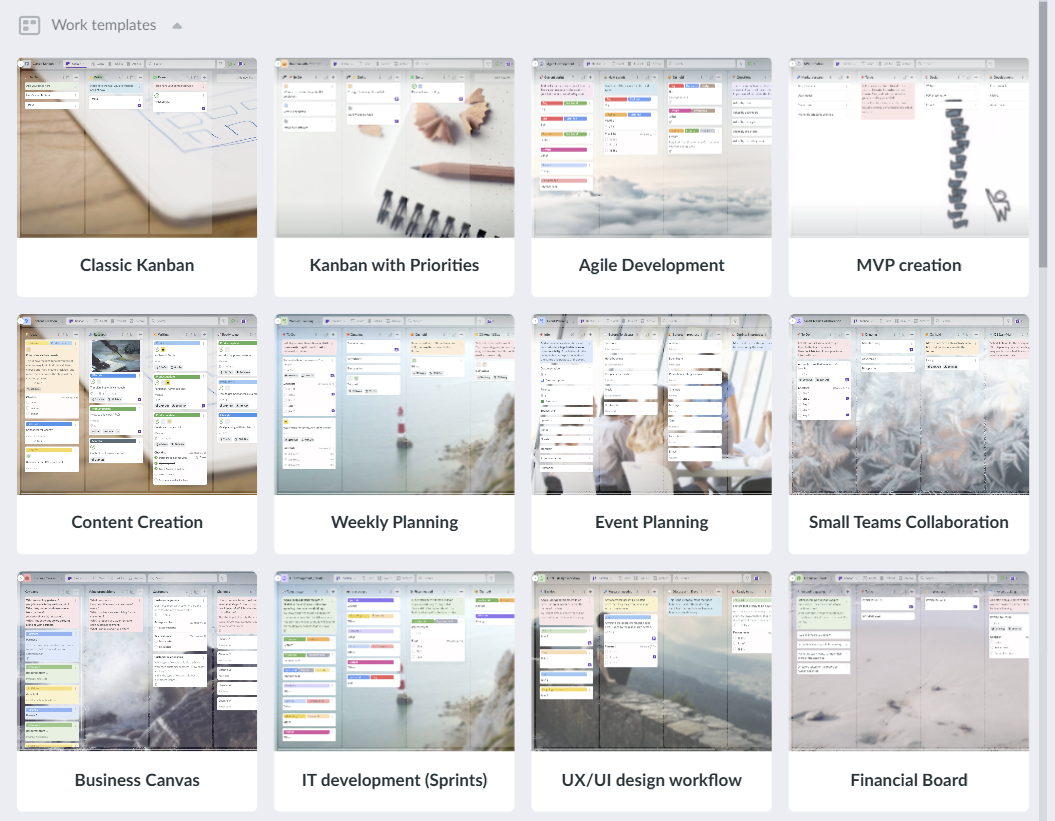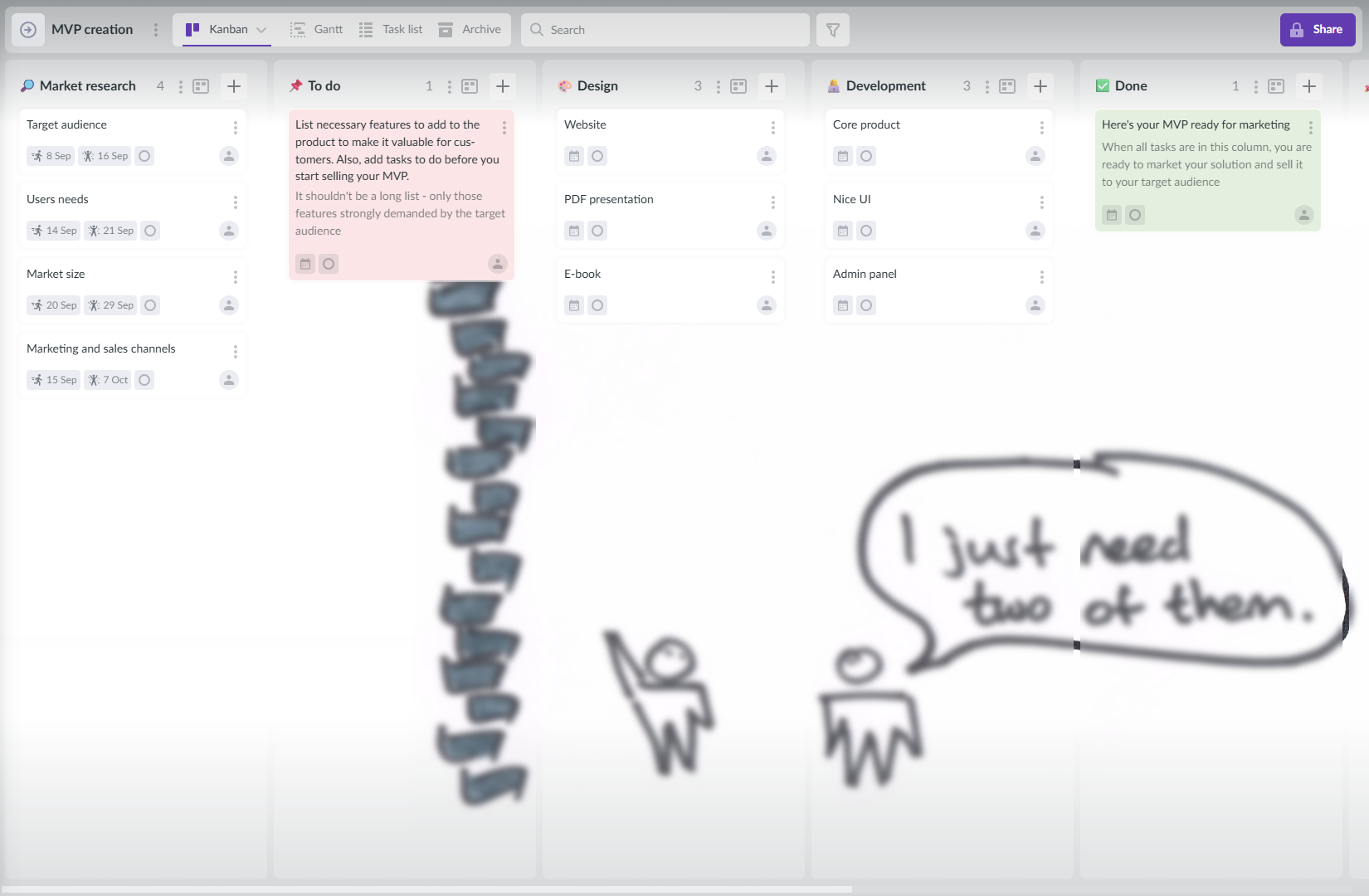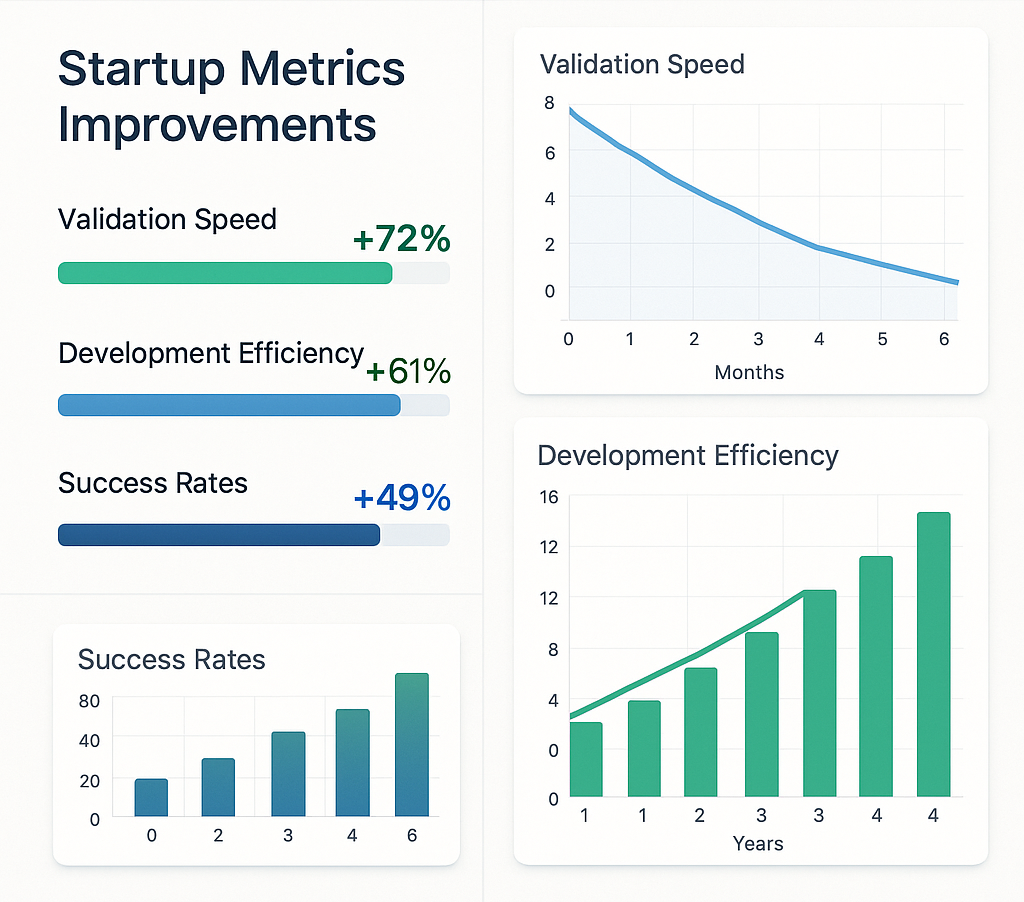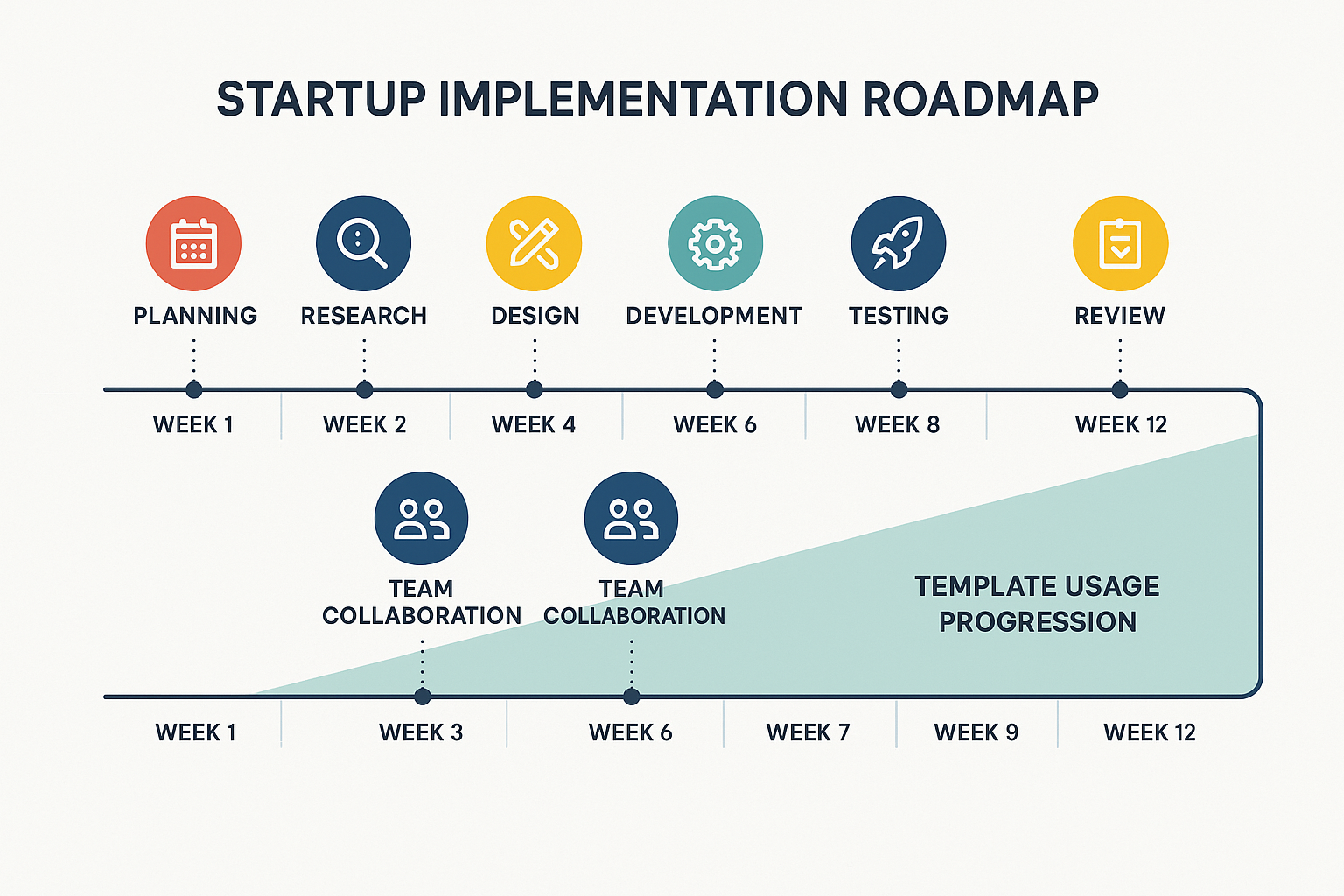In this Article:
Try Kanbanchi now
Start your free trial

Implementing the lean startup methodology shouldn’t require weeks of project management setup when you need to validate your business ideas. With 90% of startups failing due to poor market validation and inefficient processes, having proven frameworks that eliminate administrative overhead is crucial for success.
This comprehensive guide provides you with ready-to-use Kanbanchi templates specifically designed for the complete idea-to-MVP journey, hypothesis validation, and product launch. They have helped hundreds of startups accelerate their path to product-market fit. Transform your startup workflow from chaotic experiment tracking to a structured methodology implementation. Focus your team’s energy on building and validating products that customers actually want.
Statistics reveal why most startups fail:
These failures stem from fundamental implementation problems rather than poor ideas. Startups waste precious time on project management setup instead of customer validation, creating systematic problems that compound over time.

Structured lean methodology implementation dramatically improves startup success rates and time-to-market
A lack of a systematic approach to hypothesis testing leads to random experiments without established learning frameworks. Teams conduct customer interviews without structured analysis, build features without validation metrics, and make pivot decisions based on intuition rather than data. This chaotic approach prevents the systematic learning that lean startup methodology requires for success.
Difficulty tracking and analyzing experiment results across team members creates knowledge silos that prevent organizational learning. Individual contributors conduct validation activities without systematic documentation, making it impossible to identify patterns, measure progress, or make informed strategic decisions.
Inconsistent implementation of lean principles compounds these problems through varying interpretations of methodology frameworks. Team members apply build-measure-learn cycles differently, creating confusion about validation criteria and decision-making processes.
Resource allocation inefficiencies, often accompanied by unclear workflow structures, can drain startup finances through duplicate work, unclear priorities, and misaligned team efforts. Organizations report a 40% waste of resources when operating without structured project management frameworks designed for startup validation activities.
Kanbanchi offers several templates specifically designed for implementing the lean startup methodology. These templates integrate core lean principles with practical project management workflows, enabling teams to focus on validation rather than administrative setup.

The Business Model Canvas template provides a visual framework for documenting and testing fundamental business assumptions. Teams can collaboratively develop business model hypotheses, track validation progress, and pivot based on customer feedback using integrated validation workflows.
Hypothesis Testing and Validation Experiment template enables systematic experiment design, execution tracking, and results analysis through structured card workflows. Each template includes success criteria definition, metric tracking, and learning documentation capabilities essential for data-driven decision-making.
MVP Planning and Development Sprint templates combine agile development practices with lean validation principles through integrated planning workflows. Teams can prioritize features based on customer feedback, track development progress, and maintain focus on validated learning objectives.
Planning and Decision-Making templates provide frameworks for systematic strategic pivots based on validation data rather than assumptions. These templates include evaluation systems for criteria, resource allocation planning, and communication workflows to facilitate team alignment during strategic transitions.
All other templates can also be used to structure and manage workflow when launching a new product to the market. The ability to create boards from scratch helps you craft them for any specific niche.
Minimum viable product development requires balancing speed with systematic validation, demanding structured approaches that maintain lean principles while delivering functional solutions. Kanbanchi’s MVP templates integrate agile development practices with customer feedback loops, which are crucial for identifying a successful product-market fit. These are the essential processes that Kanbanchi can support with project boards, including the built-in templates.
Using customer feedback data enables data-driven product development decisions rather than assumption-based feature selection. Kanban boards provide structured frameworks for organizing potential features by customer value, development effort, and validation priority. It ensures teams focus resources on capabilities most likely to achieve product-market fit.
Resource allocation across team members requires systematic coordination of technical capabilities, timeline constraints, and validation objectives. Built-in template includes a sprint planning workflow that strikes a balance between development velocity and learning velocity. With this template, teams maintain focus on validated learning rather than feature completion metrics.
Teams can monitor feature completion, customer feedback incorporation, and validation metric achievement within unified project management frameworks that support rapid iteration cycles. It adds visibility into both development progress and validation progress through integrated dashboard capabilities.
Kanbanchi boards help establish systematic testing procedures that validate both technical functionality and customer value delivery through structured quality assurance processes. This is how MVP functionality meets customer expectations while maintaining development speed requirements.
With the help of Kanbanchi project boards, teams facilitate cross-functional collaboration, which is essential for successful product launches that achieve measurable market traction. It provides the alignment between product development, marketing activities, and customer success initiatives through integrated project management workflows.

MVP creation template streamlines product building
Template customization supports various MVP approaches, including concierge MVPs, wizard-of-oz testing, and prototype validation, depending on the product’s characteristics and market requirements. Each template variation maintains core Lean Startup principles while accommodating specific validation methodologies suitable for different business models and customer segments.
Systematic hypothesis validation is the core of the lean startup methodology, requiring structured approaches to experiment design, execution, and analysis that generate actionable insights for informed strategic decision-making. Effective experiment tracking transforms assumptions into validated learning through data-driven processes.
Experiment design templates with clear success criteria and metrics provide frameworks for creating testable hypotheses that generate meaningful data about customer behavior, market demand, and solution effectiveness. Each experiment template includes hypothesis statements, validation methods, success criteria, and measurement approaches that ensure rigorous testing of critical business assumptions.
A/B testing workflow organization and results analysis processes enable systematic comparison of different approaches to customer problems, product features, and marketing strategies. Templates include structured procedures for experiment setup, data collection, statistical analysis, and insight generation, supporting informed decision-making based on customer behavior data.
Pivot vs. persevere decision-making frameworks and criteria provide structured approaches to strategic decisions based on validation results rather than intuition or assumptions. Templates include decision matrices that evaluate experiment outcomes against predefined criteria, enabling objective assessment of when to pivot business models, target markets, or product strategies.
Learning documentation and knowledge sharing across team members ensures that the organization learns from validation activities, rather than relying on individual insights that don’t scale. Templates include structured formats for documenting experiment results, insights, and strategic implications that support team alignment and informed decision-making.

Systematic hypothesis validation ensures data-driven decisions and validated learning throughout the startup journey
Cross-experiment pattern recognition capabilities enable the identification of trends and insights that emerge from multiple validation activities over time. Teams can analyze experiment results collectively to identify customer behavior patterns, market trends, and product-market fit indicators that inform long-term strategic planning.
Documented implementation examples demonstrate how structured lean startup methodology templates accelerate validation timelines, enhance decision-making quality, and increase the probability of success through systematic approaches to product development and market validation.
SaaS startup accelerating customer validation from 6 months to 6 weeks through the implementation of structured customer discovery templates that standardized interview processes, hypothesis tracking, and insight synthesis. The team eliminated duplicate research activities, improved the quality of customer feedback, and identified product-market fit indicators 75% faster than industry benchmarks through systematic validation workflows.
E-commerce platform reducing MVP development time by 40% using structured templates that integrated feature prioritization, development sprint planning, and customer feedback incorporation within unified project management frameworks. Systematic validation approaches enabled the team to eliminate unnecessary features, focus development resources on validated customer needs, and achieve faster time-to-market with higher customer satisfaction metrics.
Mobile app startup enhances pivot decision-making through systematic experiment tracking and validation frameworks, providing objective data for strategic decisions rather than assumption-based pivots. Structured templates enabled the team to identify failing hypotheses earlier, pivot based on validation data, and achieve product-market fit in 60% less time compared to previous product development attempts.
B2B service company streamlining product-market fit discovery process using integrated customer development and MVP templates that coordinated customer interviews, feature development, and market validation activities within systematic workflows. The structured approach reduced resource waste by 45% while improving customer satisfaction and market penetration rates through data-driven product development decisions.
Success measurement across implementations reveals consistent patterns, including a 30-50% reduction in validation timelines, a 40-60% improvement in resource allocation efficiency, and a 25-40% higher achievement rate of product-market fit compared to unstructured approaches. Teams report improved decision-making confidence, reduced strategic uncertainty, and enhanced collaboration effectiveness through the systematic implementation of lean startup principles.
Template customization enables adaptation of lean startup frameworks to specific industry requirements, business models, and organizational characteristics while maintaining core methodology principles and proven success patterns.
Industry-specific template modifications for B2B, B2C, and marketplace models address unique validation requirements, customer development approaches, and go-to-market strategies specific to different business contexts. Customization options include modified workflow stages, specialized metrics tracking, and industry-appropriate validation methodologies while preserving systematic learning frameworks.
Team size scaling considerations, ranging from solo founders to multi-person teams, necessitate adapting collaboration workflows, communication processes, and responsibility assignment structures within established template frameworks. Scaling options accommodate different organizational structures while maintaining a focus on validation and systematic learning approaches, which are essential for startup success.
Advanced workflow automation and notification configuration options reduce administrative overhead while maintaining systematic validation processes through intelligent task management and progress monitoring. Automation capabilities include experiment scheduling, feedback collection reminders, and validation milestone alerts, ensuring consistent implementation without manual supervision.
Template sharing and collaboration across distributed startup teams enable knowledge transfer and best practice adoption through systematic template distribution and customization guidance. Sharing capabilities support template libraries, version control, and collaborative customization that accelerate implementation across multiple projects and team configurations.
Customization frameworks maintain core lean startup principles while enabling adaptation to specific organizational needs, market characteristics, and product development requirements. Advanced implementation strategies offer scalable approaches that support startup growth from initial validation through achieving product-market fit and beyond.
Systematic measurement of lean startup methodology implementation provides an objective assessment of framework effectiveness, resource utilization optimization, and strategic decision-making improvement through quantifiable business impact metrics.

Data-driven measurement demonstrates tangible benefits from structured lean startup methodology implementation
Time-to-validation reduction for customer discovery and market research phases represents immediate measurable benefits from structured template implementation. Organizations typically achieve a 40-60% reduction in validation timelines through systematic customer development processes, standardized interview frameworks, and structured insight synthesis workflows.
MVP development cycle acceleration and resource efficiency improvements result from focused feature prioritization, systematic development planning, and the incorporation of integrated customer feedback. Teams report a 30-50% reduction in development timelines while achieving higher customer satisfaction metrics through data-driven product development decisions.
Experiment velocity increase and learning rate optimization measurements demonstrate enhanced organizational learning capabilities through systematic hypothesis testing, structured experiment design, and integrated results analysis. Organizations achieve 50-70% improvement in learning velocity while reducing resource waste through focused validation activities.
Pivot decision accuracy improvement through systematic data collection and analysis frameworks reduces strategic decision risks while improving pivot success rates. Teams using structured validation approaches achieve 60% higher pivot success rates compared to those relying on intuition-based strategic decisions.
Enhancing startup success probability through the implementation of a structured methodology provides long-term competitive advantages that compound over time. Organizations implementing systematic lean startup approaches achieve success rates 25-40% higher than those using unstructured product development approaches.
ROI calculation frameworks encompass both direct cost savings through reduced waste and improved efficiency, as well as indirect benefits, including enhanced decision-making quality, reduced strategic risk, and accelerated time-to-market achievement. Most organizations achieve a positive ROI within 90 days of implementing a systematic approach, resulting in immediate efficiency improvements and enhanced validation capabilities.
The systematic implementation of lean startup templates requires a structured onboarding process that balances rapid deployment with thorough team training, ensuring immediate value delivery while building long-term capabilities for sustained success.
Week 1: Template setup, team onboarding, and initial hypothesis identification establish foundation capabilities through Kanbanchi account configuration, template selection, and team access setup. Initial activities include creating a customer discovery board, documenting hypotheses, and establishing validation criteria that enable systematic learning from the outset.
Week 2: Customer discovery launch and interview scheduling using templates transitions teams from setup to active validation through structured customer development activities. Implementation includes customizing the interview guide, coordinating customer outreach, and establishing a feedback collection system that generates immediate market insights.
Week 3: Experiment design and validation testing implementation applies systematic validation frameworks to critical business hypotheses through structured testing approaches. Activities include creating experiment cards, defining success criteria, and setting up a data collection system that enables the objective validation of customer problems and solution approaches.
Week 4: Results analysis, learning documentation, and next phase planning synthesizes initial validation results into strategic insights that inform product development and market strategy decisions. Implementation includes insight documentation, team learning sessions, and strategic planning activities that establish a foundation for continued validation and iteration cycles.

Implementation success requires commitment to systematic data collection, regular validation reviews, and continuous process improvement based on team learning and customer feedback. Organizations achieving successful 30-day implementations report immediate improvements in decision-making quality, team collaboration effectiveness, and customer insight generation that compound over subsequent validation cycles.
Milestone tracking ensures progress monitoring and problem identification through regular check-ins, progress assessments, and adjustment recommendations that maintain implementation momentum while addressing emerging challenges or opportunities for optimization.
You may also be interested in other Kanbanchi blog articles for startuppers; check them out!
Most startups experience immediate operational improvements within the first week of implementing the template, including better task organization, more straightforward responsibility assignment, and enhanced team communication. Measurable validation improvements typically appear within 2-4 weeks, with significant strategic insights emerging after 6-8 weeks of systematic implementation. Organizations report a 40-60% reduction in validation timelines and a 30-50% improvement in decision-making quality within the first quarter of implementing the structured approach.
Teams familiar with basic project management concepts typically achieve proficiency with Kanbanchi templates within 3-5 days of initial setup. Complete adoption of the lean startup methodology requires 4-6 weeks for habit formation and process integration across team workflows. Organizations provide the most effective onboarding through a combination of template-based learning, practical application, and iterative improvement based on early implementation experience.
Kanbanchi templates provide extensive customization capabilities, including workflow modification, field customization, and integration setup that accommodates B2B, B2C, marketplace, and SaaS business models. Industry-specific adaptations include modified validation approaches, specialized metrics tracking, and tailored go-to-market frameworks while preserving core lean startup principles and systematic learning methodologies.
Implementation support includes comprehensive documentation, video tutorials, guidance on template customization, and community forums for sharing best practices. Teams can access template libraries, customization examples, and implementation case studies that accelerate adoption while reducing common implementation challenges and setup errors.
Templates scale effectively from individual founders to teams of 20 or more members through flexible collaboration features, role-based permissions, and scalable workflow configurations. Solo founders benefit from systematic validation frameworks and structured learning processes, while larger teams gain coordination capabilities and shared visibility, which are essential for effective collaboration across multiple validation activities.
Systematic template implementation generates consistent metrics, documentation, and progress tracking that support investor communication through regular reporting capabilities and the development of dashboards. Teams can demonstrate progress in validation, customer development activities, and strategic decision-making processes through comprehensive documentation and analytics that investors require for informed funding decisions and ongoing portfolio management.
The structured implementation of a lean startup methodology represents a fundamental competitive advantage in today’s entrepreneurial landscape, where 90% failure rates demand systematic approaches to validation, product development, and market entry. Organizations that master disciplined validation processes consistently outperform competitors through faster time-to-market, more efficient resource utilization, and higher product-market fit achievement rates.
Kanbanchi’s comprehensive template library provides essential foundation capabilities for systematic lean startup implementation through proven frameworks that eliminate setup time while maintaining focus on validation activities. The platform’s native Google Workspace or Microsoft integration ensures seamless adoption within existing organizational workflows while providing enterprise-grade functionality that supports both individual founders and scaling teams.
Ready to accelerate your startup journey from idea to MVP using proven lean methodology frameworks?
START YOUR FREE KANBANCHI TRIAL TODAY
and transform your product development process with structured workflows
In this Article:
Start using Kanbanchi now
Start your free trial